| Thursday, May 3, 2012 |
| An evolving path |
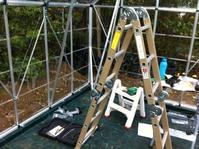 I've spent the last couple of months doing quite different things from what I normally have. I've been outside, digging in the garden, tinkering, using power tools. And I've been studying a bunch of new things I knew nothing about. Aquaponics, fish, plants, plumping, permaculture, forest gardens, and many sub-subjects of each. Now, this is really quite uncharacteristic. I.e. I've never been interested in any of those things before. But maybe it is not so uncharacteristic of me to dive deeply into a new subject. I've spent the last couple of months doing quite different things from what I normally have. I've been outside, digging in the garden, tinkering, using power tools. And I've been studying a bunch of new things I knew nothing about. Aquaponics, fish, plants, plumping, permaculture, forest gardens, and many sub-subjects of each. Now, this is really quite uncharacteristic. I.e. I've never been interested in any of those things before. But maybe it is not so uncharacteristic of me to dive deeply into a new subject.
And, looking a couple of posts back, 2011 Accomplishments and 2012 Aims, I notice that this is actually exactly what I said I would do. What is new is that I might be writing more about it. Doing more physical things, building stuff, watching nature, surprise, that actually leads to lots of deep things to talk about. But I'll also just talk about those practical things, without any need for them to be deep. Resilient, local, distributed, empowering action has always been part of the subtext here. And there's lots of practical stuff it might be a good idea to start paying attention to. [ Diary | 2012-05-03 00:04 | 17 comments | PermaLink ] More > |
| Monday, January 2, 2012 |
| 2011 Accomplishments and 2012 Aims |
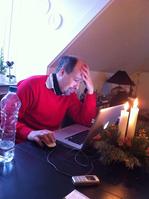 It can be stimulating and rewarding to once in a while take stock of what one has accomplished and what one aims at doing next. The new year is traditionally a good time for doing that. And, I'm in part inspired by such a post from Vanessa Miemis. It can be stimulating and rewarding to once in a while take stock of what one has accomplished and what one aims at doing next. The new year is traditionally a good time for doing that. And, I'm in part inspired by such a post from Vanessa Miemis.
To illustrate one good reason for writing it down, when I at first think about what I might have accomplished in 2011, I draw a blank. Didn't really do much, and hadn't really planned anything either. But when one looks a bit closer, there's of course more there... 2011 In 2011 I regained hope. Not that I was particularly hopeless, but there was a certain cynicism that had crept in. A "been there, done that, it didn't work" kind of attitude, hovering behind my habitual optimism. Now, suddenly, there are lots of reasons to be hopeful. The right people are starting to connect in the right ways. Ideas gain traction that previously didn't. Conflicts that previously existed, no longer have much power. On the world scene, the centralized control system is crumbling fast. We have a unique opportunity to put something better in place. For the first time since the 1990s do I feel really energized and hopeful about this being the time when it is possible. In 2011 I found my philosophical voice in a new way. That was actually a life hack. I'm a member of a local Toastmasters club where people practice public speaking. It is a good piece of advice for a public speaker to collect material that will be ready for use whenever one is called upon to say something. Stories, jokes, quotes, that kind of thing. So, I made a document for recording good material when I ran into it. I made one of the categories My Own Quotes, i.e. stuff I've said that I can be quoted for, because I wasn't able to come up with anything at the time. Surprisingly, it turned out that I suddenly started saying more things that were quotable, on Twitter, on Facebook, etc. Which in turn, ironically, means I have little use for my list, as it is more fun to make up something new. I've met a lot of people. Specifically, I now feel part of a global network of the "right" kind of people, which is really a mix of different kinds of people, but one that fits. And it is not one thing. Rather, I notice overlapping groups coming together, sort of under the surface, without formal leaders. Things are more likely to happen in hidden Facebook groups or private hangouts. Not that there's anything secret going on, but it seems more productive with self-selecting groups that invite new members personally, rather than very visible public groups and causes that people go and join for abstract reasons. The Next Edge is one name for a loose group that is quite happening. In October I was in New York for a week. Participating in ContactCon, a MetaCurrency collabathon, and hanging out on Liberty Square with Occupy Wallstreet. All of it very inspiring. Meeting a bunch of kindred souls I otherwise knew only online. And the Occupy movement added a very tangible and present focus, an incarnation of much that we're talking about, and a surprising inspiration that sends things in a new direction. It was enlightening to see how a small group of people sleeping under tarps in Zuccotti park could hold the world's attention. Very inspiring to experience the consensus process in a General Assembly. In 2011 I began to see Dialogue happening online. I.e. it seems possible for small groups of people to share a space with each other in a mindful manner, without agenda, without posturing, without conflict, exploring the unknown together. I have previously attempted that, and failed, so it is new. I decided to move forward with some of what I consider my own online projects, stuff I haven't gotten around to for years, despite not really having time. Ironically, since I'm busy being a paid programmer for other people's projects, I am now experimenting with outsourcing some of my own programming projects to others. It is still unclear whether it will bear fruit, but it is nevertheless satisfying to see activity. I started adjusting my work environment more to my liking. I'm now working on a standup desk most of the time, which I think is more healthy. 2012 I'm intending to revamp my web presence, including sites that I'm responsible for that have been stagnant. Most important will probably be a long-awaited re-launch of newciv.org, with a somewhat different spin. But I'd also like to make my personal web presence more coherent, as it is spread over a number of sites now, hard to follow in one place. I also hope to launch one or two useful tools on the web that might gain some traction. I'm right now really excited about taking up aquaponics. I.e. cultivating fish and vegetables together in a small eco-system. I'm right now learning what I need to know, but I plan on getting that all going this year. In a greenhouse, I'm thinking. I'm not otherwise somebody you're likely to find outside with his hands in the dirt, so this will require some learning. What motivates me is in part that it involves technology, besides it being completely organic and producing no waste. We already have chickens, we have a large backyard with fruit trees, and a well on the property, so we have good potential for being able to be quite self-sufficient. The aquaponics thing will be one thing to inspire/force me to be more handy. I'm a software guy and haven't traditionally been somebody you'd find in the garage with power tools. But I'd like in various ways to be more of a maker and tinkerer. In part for the fun, in part for the self-sufficiency aspects, in part because I think the economy is going in that kind of direction. So, if I don't run out of money from buying aquaponics equipment, I'm thinking maybe 3D printing, maybe some kind of solar panel setup. We can't use the standard government sponsored approach to that, as we only rent this house. Oh, and I need webcams, so I can monitor my aquaponics setup, etc. I have almost no network here locally of the kind that is in sync with what I'm into online. That is rather odd, if I compare with how it was for us in California. I hope to remedy that this year. That might be local groups that are into permaculture, local economies, the local fablab, co-ops, dialogue, etc. My current choice for exercise and socializing and being more in my body is dance. So, I'll continue going to dance classes 3-5 nights per week. This year I hope I will master it to a sufficient degree, or maybe just relax with it, that it can be mainly the form of creative expression and social fun that I love, and not about remembering steps and sometimes awkwardly failing. Oh, and I need to make money too. I'm aiming to become independent of paid work this year. I'm 1/3 of the way there. That is, 33% of my income is residual income from my own website projects. I'd like to get that to 100%, so that I can concentrate on doing what needs doing, not what I must do in order to make a living. I intend to spend more time speaking the truth, or looking for it, if it isn't available. Less time being worried about what anybody else will think. Less time trying to please others even though things don't really fit. I will aim at being a conductor, not a resistor. Preferably a superconductor. [ Diary | 2012-01-02 13:52 | 13 comments | PermaLink ] More > |
| Thursday, November 17, 2011 |
| Your inner piece |
 It is one of the metaphors I most readily reach for when called upon to say something motivational. It isn't terribly original, but it is easily understood and perfectly reusable. It is one of the metaphors I most readily reach for when called upon to say something motivational. It isn't terribly original, but it is easily understood and perfectly reusable.
We all have a piece of the puzzle. Everybody knows, of course, that all of the pieces of a puzzle are different, and that we need all of them to complete the puzzle. It is awfully unsatisfying if there's a piece missing. There'll be a glaring hole in the middle of the puzzle. Now, we're talking about some kind of global puzzle. So, here, all of us have a piece, maybe even several, and we're not going to complete the puzzle unless everybody's getting their piece out, unless everybody's placing it in the place where it fits. That takes a little bit of work, to find out where it fits. But if you don't bother doing it, if you just leave the piece in your pocket, or in the box, or you lose it, thinking it doesn't matter, that piece will always be missing. Some pieces might be just one of many that are more or less the same color or texture, in the middle of an ocean or a wall, or whatever's on the picture. That doesn't make them any less important, as they will be equally missing if they aren't there. As mentioned, the pieces are different, and each one fits in a particular place. It's no good to try to change a piece into looking like some of the other ones, and it is no good to try to force it into fitting some place where it doesn't. Which should remind you of some of the things we humans do, en masse trying to do the exact same thing, in order to "fit in". Consuming the same products, commuting to work at the same time, to do the same kinds of jobs. All the while spending no time looking at what our actual piece is and where it fits. There's a nice unity and diversity thing to the metaphor. We're all unique, but we also have something to do together. Everybody's important. We could develop it in different directions. Like, we could say that there's your external piece of the puzzle. What you do in the world, what you're available for, what you have to offer, and your particular style of doing it, the shape of your piece. But we could also say that there's an inner piece that you have. That which makes you unique, but also what makes you feel at home, and what makes you feel complete. Because there's nothing missing to that piece. Sure, it might fit with other pieces, but it doesn't have to, it is perfect as it is. The thing about your inner piece is that if you haven't found it, or you don't know that you already have it, you might be running around looking for pieces of yourself, or looking for places to fit in. But you can keep looking outside yourself for it forever, without result, because it isn't out there. On the contrary, it is the only thing that isn't out there. It's who you are. Once you find it, or at least realize you already have it, you can relax. There's no longer anything you urgently have to seek. Rather, surprisingly, things suddenly become easier. Because you're now being something that actually fits, and maybe not that surprisingly after all, the universe around you fits you. We could well say that it is two sides of the same thing. The inside and the outside. Your particular inner being and the universe around you. They're maybe one and the same thing, but that's a little theoretical for practical use, unless you're unusually enlightened. But, if we stick with my puzzle metaphor a tiny bit longer, it gives a perfect explanation for how we each are unique, and how we each have a unique perspective on the universe. Just imagine the cutout of one puzzle piece, in the middle of a puzzle extending to infinity in all directions. In such an infinite field you can cut out different pieces in an infinite number of ways. And for each single one, the rest of the universe will look different, because it is the mirror image of the cutout. And none of the pieces will quite fit in if it tries to be just like any of the other ones. And none of them will quite feel at home if it tries to fit into the world that one of the other pieces sees. But if there's harmony and agreement between what one is and the world one is in, then things suddenly flow. The truth opens things up. So, grab your inner piece in any way you can. Or just be confident that it is there. [ Diary | 2011-11-17 02:20 | 6 comments | PermaLink ] More > |
| Tuesday, February 1, 2011 |
| Slow Mo Flow |
 I had kept in the back of my mind the memory of the best feedback anybody ever gave me on my blog. I hadn't made an effort to remember exactly who said it or what they said, but I remembered the core feeling of it. But now that I suddenly decided to find it again, I had quite some difficulty doing so. My blog doesn't have a search on feeling. But finally I found it. It is from this article: The things to do. It might well surprise you that I think it is the best comment I got, because it certainly isn't the most glowing praise I've received. Lots of people have said some very, very nice things about me, and I'm happy for it. But this was more about providing an insight. In this case an insight into how and why I write. This is the central part of the comment from lugon: I had kept in the back of my mind the memory of the best feedback anybody ever gave me on my blog. I hadn't made an effort to remember exactly who said it or what they said, but I remembered the core feeling of it. But now that I suddenly decided to find it again, I had quite some difficulty doing so. My blog doesn't have a search on feeling. But finally I found it. It is from this article: The things to do. It might well surprise you that I think it is the best comment I got, because it certainly isn't the most glowing praise I've received. Lots of people have said some very, very nice things about me, and I'm happy for it. But this was more about providing an insight. In this case an insight into how and why I write. This is the central part of the comment from lugon: I don't think I'll spoil any secret if I say something of what's in Ming's writing. It's just slow mo! Just imagine a bike running across the fields: it leaves many small curves untouched. Ming just takes it slow and so his bike touches all those small curves. Which is interesting, considering it looks like he's at full speed all the time.That rang a number of bells for me. Nobody else has ever described it like that, before or after. I love writing, or rather, I love when I manage to express something real in writing. I don't do it very often. I've actually done it rather little in the last few years. When I get away from it, I have a hard time finding the path again. I might make attempts, but it just isn't right. But when it is right, it is like that. Freezing the moment and describing everything that's in it, while simultaneously being full speed ahead. It is really just being mindful of the experience one is having. But I want to live there more. [ Diary | 2011-02-01 00:05 | 11 comments | PermaLink ] More > |
| Saturday, January 22, 2011 |
| Recognition |
 Occasionally, going about my business some day, I wake up, surprised to find myself again in the present moment. I had of course not been altogether asleep since the last time, but it feels kind of like it. Suddenly, one moment it is all clear and present and very real, and I'm very clear and present. The strange part about it is the recognition that it is the same place where I was before. Exactly the same awareness. But "before" is, like, 10 years ago, or 40, or a thousand. But there's no doubt I was there before. Occasionally, going about my business some day, I wake up, surprised to find myself again in the present moment. I had of course not been altogether asleep since the last time, but it feels kind of like it. Suddenly, one moment it is all clear and present and very real, and I'm very clear and present. The strange part about it is the recognition that it is the same place where I was before. Exactly the same awareness. But "before" is, like, 10 years ago, or 40, or a thousand. But there's no doubt I was there before.
That feels shocking. Like when you've driven home from work in your car, while thinking about something else, and you suddenly find yourself in your garage, having no clue what happened along the way, as you weren't really there. It doesn't have to be an enlightening spiritual thing, although sometimes it is. Might just be to recognize and remember something. A smell I knew as a child, and suddenly it is there again 40 years later, and there's a package of sensations and thoughts that go with it. Where was it hiding during all that time? Or a person, of course. You look into their eyes, and, bing, you recognize them. You're there with them again, despite that you just met. It is the same, even though everything is different. Why not stay in that moment where everything is connected? Does the intervening sleep-walk serve a purpose? I don't know. [ Diary | 2011-01-22 18:40 | 6 comments | PermaLink ] More > |
| Monday, August 23, 2010 |
| Where's Ming? |
| I'm usually always active somewhere. Not necessarily in my blog. Maybe it is time to invent a new type of site that shows one's activity, even if it is spread over multiple sites. People have already invented sites that track somebody down across many social network sites. But that still isn't quite right. Would make more sense with a site that I control that makes it easy to see what I'm up to.
Anyway, one can usually find me on Twitter, and recently I've posted stuff on Quora. It is a site where people post questions and answers in different topics. And since I often get triggered by a question, that kind of works well for me, even if it is somewhat random what I end up answering. [ Diary | 2010-08-23 00:36 | 6 comments | PermaLink ] More > |
| Tuesday, July 20, 2010 |
| Getting other people to do stuff |
 I'm going to give outsourcing another shot. Which isn't easy, because I'm kind of bad at delegating, and I seem to be missing a bit of business sense. I'm going to give outsourcing another shot. Which isn't easy, because I'm kind of bad at delegating, and I seem to be missing a bit of business sense.
It can all change, of course, but it is somewhat traumatic. There are a number of things I'm very good at. Possibly some things I'm absolutely brilliant at. But I spend a big portion of my time doing stuff I'm not very good at, working hard, long hours, and what I have to show for it is somewhat mediocre. There's some amount of emotion wrapped up in that too. It isn't fair. It's stressful. It pisses me off. I'm kind of apathetic about changing it. Despite my better judgement, I seem to believe that if I just work a little harder, then, maybe, it will all work out, and I can get around to the stuff I really want to do. But generally it doesn't seem to make a lot of difference how hard I work. I've only fairly recently realized that I need to learn the basic principles of business and marketing. I've always had a certain amount of contempt for a society that's organized around buying low and selling high, around deceiving people into buying stuff they don't need, where most of the resources end up owned by people who do clever tricks with numbers, rather than by the people who work and produce stuff. But I can also change my mind, and notice that some of the principles of business apply to any activity, whether there's money involved or not. To create more value, it makes sense to look for opportunities to shift resources from areas of low productivity to areas of high productivity. Which happens to be one of the definitions of entrepreneurship. Why not get the most bang for the buck, whether money is involved or not? Work smarter, not harder. I'm trying to convince myself here. One of the sensible and fashionable things to do, if one is independent and makes more than minimum wage, is to outsource as much of one's work as possible, particularly the stuff that isn't one's core competency and that could be done as well, or better, by somebody being paid a lot less. I first have to get over a bit of distaste for doing that, and convince myself that it can be a win-win for everybody. Really, there are other parts of the world where the cost of living is very different, and where there are loads of well educated people who'd love to work for me for a fraction of what a similar worker would cost where I live. I don't have to feel bad about that. Part of what is hard for me when I employ somebody else to do something is that I have to be able to make decisions based on their performance, and fire them if it doesn't work. It isn't like I'm without experience. I had my own company already when I was 20, a cleaning services company, with a dozen part-time employees. That worked well, and I hired and fired people without too much difficulty, did marketing and sales, and made a profit. And I've been a manager of IT departments and development teams. That's where part of my problem would start showing up. Even if I have a handful of other programmers to work with me, who're there to do whatever I ask them to do, I have had a tendency to end up doing 90% of the work myself. Which isn't good. I was always very popular with the people on my team, though. I tried once before to outsource part of my work to a foreign worker over the net, more than 10 years ago, which is one reason I'm nervous about it. I had a guy in the Ukraine working full time for me for $1000 per month. I kind of felt it was so ridiculously little that I shouldn't really complain too much. He was a very nice guy, but so slow and unproductive that nothing he did ever really helped me with anything, and I had usually gotten impatient and solved the problem myself before he had finished his initial study of the problem, which usually took several weeks. Now, years later, he still writes and thanks me once in a while. Really, I had been paying him such a royal sum of money that he could move to a better neighborhood, buy a house, get married and have kids. Which is lovely, and I'm happy for him, but it never really created any value for me. But I'm going to give it another shot, and test performance before going to the next step. What it really is about is a transition for me. The puzzle is not primarily about money and work hours and projects for customers, but more about how to move to the next level. How can I be more effective? How can I do what I'm here to do, without getting stuck in the details? How does one start sustainable activities? Even if we're talking about an idealistic non-profit activity, it somehow needs to be financed, by money or time or work or other resources. And it needs to be done in an effective way that actually works, and keeps working. See, I have a similar problem in non-profit activities. I haven't had trouble drumming up some interest in some things I was working on from time to time, or inspiring people to join up with them in some fashion. But I have a fairly lousy track record in getting people to actually participate in developing and evolving them. Which is not their fault, but mine. To collaborate, it usually needs to be very clear what we're collaborating on. If you want others to do something, it better be very clear what it is. Somehow I've often been very vague about what there is to do, or what I need. Just like I usually have been very vague about what exactly I'm doing. You just can't easily build something precise based on vagueness. So, I'm working on being more clear, primarily on what I want, and to create more clear interfaces for how one can work with me, and what I'm available for. [ Diary | 2010-07-20 14:24 | 13 comments | PermaLink ] More > |
| Tuesday, June 22, 2010 |
| Inventory |
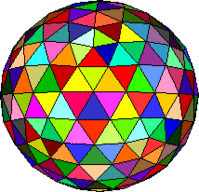 It is probably a good idea to do an inventory once in a while of one's projects and interests. Particularly when one is interested in connecting with others working on similar things. It is probably a good idea to do an inventory once in a while of one's projects and interests. Particularly when one is interested in connecting with others working on similar things.
It would also be nice if one's public presentation actually matched what one is doing or what one is aiming at doing. Once in a while I notice with some chagrin that I've left behind a number of websites and profiles and bits and pieces that mostly are either completely outdated or entirely misleading. Most of them covered with cobwebs. Some of them were cool in the 1990s, but are a bit of an embarrassment today. Then again, I've also left behind stuff that was ahead of it's time, that if it had been taken a slight bit further, or the timing had been slightly different, or the right people had come together, or I hadn't made some crucial mistake, would have been something really big that everybody would know about today. I'm focusing on collaborative Internet stuff here. Software. Patterns. I could probably make other inventories for other areas of my interests. But there's a bunch of stuff that goes together here, which relates to how people connect and work together, how information and people get organized, how society might work better, how humanity might operate at a higher level. It is really all one subject, which can be addressed from many different angles. Creativity. Synchronicity. Conversations. Synergy. Emergence. Collective Intelligence. New Civilization. And how we might use computer and communication technology for doing it orders of magnitudes better. Which at a local level might make us personally more effective and which might get small group activities off the ground faster. And at a bigger level, it might just save humanity from going extinct within the next century or two. Here are a few bullet points of stuff I previously have worked on: OrgSpace OrgSpace has been my code word for creating a better way for individuals or small groups to organizing any kind of data related to what they do. The basic idea is that there are as many dimensions to data as there needs to be, everything is linked in several directions, any item can exist in several places, because it has several dimensions, folders and categories are the same thing, just seen differently. Somewhat similar to the idea in Ted Nelson's ZigZag project. Which never really happened, because, well, it is a hard thing to create something super simple and universal. I went through a couple of early prototypes of that kind of OrgSpace, without getting very close to what I had in mind. Eventually I settled for a more pragmatic OrgSpace, a collection of modules that could be reconfigured for various collaborative purposes. Wikis, blogs, calendars, project management, contact database, event planning, ad hoc databases, forums, chat rooms, picture galleries, e-commerce, and more. All of which I programmed from scratch. Each user could add one or more of any of these modules, and create workgroups and networks of people, and decide who to share which pieces with. And they could embed them in public websites. A pretty clever system, but way, way too ambitious. Oh, it is 95% done and parts of it are still used by clients or friends or by myself. But there's just no way I, one single programmer, could keep all these modules current and keep up with an evolving world. But I tried for a while before giving up, more than 5 years ago. If you look at orgspace.com you'll see... basically nothing. It is an example of one of those misleading websites I really should do something better with. New Civilization Network I should probably have put that first, as it happened first, and some of the software I developed there ended up being used in OrgSpace. NCN wasn't particularly about software, but about creating a self-organizing network of teams that would work on building a better world. It grew out of a Whole Systems discussion group I ran in a mailing list in 1994-95. The initial vision of the infrastructure was developed with Max Sandor. The idea was to inspire the creation of a network of online communities, existing on many independently operated servers. Protocols would be developed to allow interactivity and portability between these different sites. Essentially one should be able to join any group, hosted on any server, and that group might have it's own particularities and features, but at the same time one should be able to interact with and be found by people on any of the other servers in the network. You'll notice that we're talking about a universal login and about data portability and interoperability, stuff that doesn't even really exist today, so it was maybe a bit ahead of its time. It could still have happened, if anybody else had chosen to join the effort. There was one server, run initially by Max, and later by me, but there was never more than that one. So, the imagined network became just one online community on one website. Granted, it was one of the very first social networks, which isn't half bad. I developed a lot of facilities for the site in 1995-96, like friend lists, workgroups, forums, chat rooms, and a couple of years later blogs. The blogging system I created was quite possibly the best thing around at the time, but I didn't quite realize it, as I wasn't myself happy with it yet. NCN is quite a long story and a a lot of learning took place there. Some patterns worked, some patterns didn't. As a global movement, it looked quite promising in 1995-96. Eventually it didn't take off as envisioned. For various reasons, most of them most likely my fault. It is surely not easy to launch a global self-organizing movement that aims at creating a new civilization. Anyway, if you go to newciv.org you'll see the website, pretty much like it looked in 1995. It is still active, people are still joining, there are hundreds of blogs, people use the member area, etc. But at least the public site is way overdue for a redesign and relaunch. I'm working on that. HoloWorld My own vision of how a New Civilization should work can be found at holoworld.org. Again it is something that I haven't really touched for 10 years or more. I still stand by it, even though it needs to be extended and updated and developed. Essentially it is imagining a world that entirely would work on the kinds of principles that are touched upon in Open Space conferences, in Open Source software, in P2P anything. It is a bottom up grassroots self-organization kind of thing. It is an anarchy where real community is possible. If you're free to do what you feel is right, you'll of course get together with others who want to do similar things as you, and there's a certain market economy of ideas and resources that naturally takes place. If nobody tells you what to do, and there's nobody who'll automatically do things for you, self-organizing community is what takes place. That's how people get together to develop open source software together, or how Wikipedia gets updated. Imagine if everything in the world worked like that. Well, it would only be possible if certain safeguards would be in place, primarily to avoid that a very few anti-social people would monopolize all the resources for themselves. There are other things I intend to work on, but I don't have much to show for them yet: Tools for Creativity I'd be happy just spending my time making better tools. Software tools, for enhancing the creative process, for assisting various kinds of group activities. I'm interested in patterns. Generative patterns. Certain patterns make certain kinds of things happen. Yet, a lot of software doesn't really help you much in doing what you're trying to do. You can have a meeting within a piece of conferencing software, but the whole thing is not at all patterned to help do do what you have in mind. E.g. if you have a meeting specifically to arrive at a common decision, the software should be organized so as to help you make that decision. Duh. Most software isn't structured remotely like that. These projects would probably go on my cr8.com domain. Cr8 means Create, in case that isn't obvious. Synchronicity Synchronicities are subjectively meaningful coincidences. Something happens that clicks in a surprising way. I believe that's related to being in the flow and to collective intelligence. Imagine that you can increase the number of synchronicities in your life. Things just sort of surprisingly fit. Stuff appears out of the blue that happens to be exactly what you need, even if you didn't know it before. It is a state of mind, but it might very well also be something that can be amplified and enhanced. Genes have receptors. Certain things will connect. You can increase the amount of connections by bringing in more stuff that might connect, by increasing the opportunities for connections. Similarly, the increasing interactions that the Internet has brought us can, if properly structured, increase synchronicity, increase the number of things that will connect, surprisingly. There are other things I do than these. Some are more pragmatic, ways of making a living, or minor interests. Like, I've gotten back into webcam websites recently. And, generally speaking, I'm interested in the structure of success, how one can set one's mind to do something, and then actually do it. Which includes how one deals with one's own thoughts and emotions, and what the characteristics are of viable activities. All of which are other stories. [ Diary | 2010-06-22 00:27 | 16 comments | PermaLink ] More > |
| Saturday, June 19, 2010 |
| Conversations |
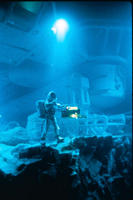 Seems like some stimulating conversations will get me out of hiding. OK, I wasn't really hiding, I just wasn't blogging. Seems like some stimulating conversations will get me out of hiding. OK, I wasn't really hiding, I just wasn't blogging.
There are certain things on my list of what I'm here to do. Sounds nebulous to people who aren't plugged into the same kind of stuff. Wiring of the global brain. Emergence of collective intelligence. Tools for creativity. Building a new civilization. Conscious evolution. Self-organization. Collaboration. They've sort of been on hold for me for a while. At least after I realized that one can't avoid having to make a living, however much that sucks. So I added to my list of interests: Escape velocity. Organizing viable activities. Even: Internet marketing. And: Managing beliefs. Living deliberately. I'd prefer to spend my days inventing stuff that will change the world. Maybe I will, once I get a couple of key things in place. But there's no reason to procrastinate either. A couple of recent conversations has made me realize that there are smart people out there working on the kind of stuff I'm into. Which makes me rather hopeful. It might indeed be time to wake up and start the generators again. [ Diary | 2010-06-19 23:10 | 14 comments | PermaLink ] More > |
| Wednesday, October 28, 2009 |
| Then a miracle occurs |
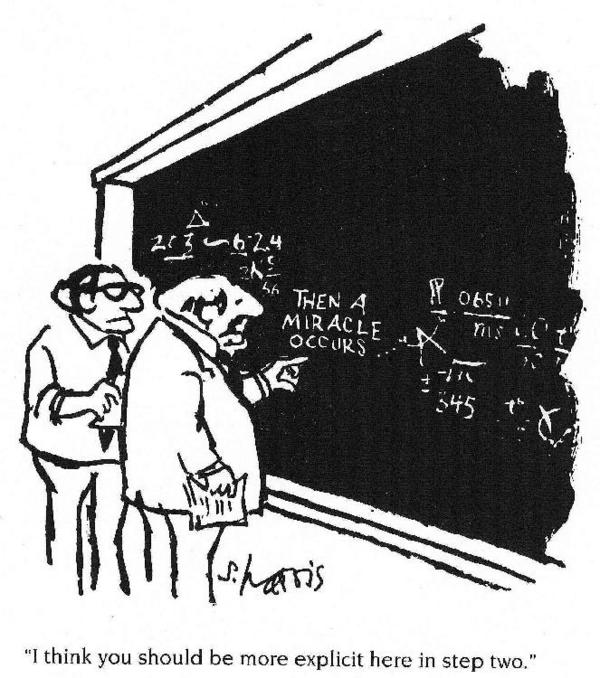 I love this cartoon, by Sidney Harris. For several reasons. One is that this is a fallacy often exhibited by people trying to sell you an ambitious theory about something big and important, a theory that pretends to be all encompassing and consistent and coherent. But it has one of those "then a miracle occurs" in the formula somewhere. Usually the proponents of the formula hadn't noticed, and they'd tend to deny it if it is pointed out. Think about the Big Bang, for example. Theoretical physicists can calculate what apparently happened in the first moments after that event and they can correlate the whole universe with it. But they usually carefully avoid any question of how come an infinitely small nothingness suddenly can explode, or where such a thing might have some from, or how come it can explode so neatly. A miracle happened, and then we suddenly can apply all these lovely formulas. Or evolution. There are lots of signs that evolution is happening and that it has happened for billions of years and that it happens quite automatically. But the pink elephant in the room is how come it is happening in the first place. That's the miracle that any evolutionary biologist carefully would avoid to explain. Which is a bit like making a carefully and exhaustive study of automobiles without ever considering where they come from. Take consciousness. A lot of scientific minded folks believe that consciousness is something that suddenly appears when you make a computer that is complicated enough. Just like life is something that happens if you mix a sufficiently complicated bunch of elements together. All of the elements can be carefully studied and catalogued and put under a microscope. But ... then a miracle occurs. Of course, the thing to do, like in the cartoon, is to gently point out that maybe the formula needs a little bit more work at that point. I also like it because I do believe in miracles. Existence, life, evolution and consciousness is pretty damned miraculous stuff. I find it delightful that life and the universe can't all be reduced into a neat and complete mental model that fits into the small head of a hairless monkey walking around on the surface of a little planet in the outer rim of a minor galaxy, but that there's plenty of mystery left. At the same time, it is fun to try (to understand everything). But there will usually always be a "then a miracle occurs" somewhere in the formula. And I think the answer is not to try to get rid of it, or pretend it isn't there, but to embrace it. [ Diary | 2009-10-28 12:31 | 17 comments | PermaLink ] More > |
| Monday, July 27, 2009 |
| Reboot 11 / The Art of Not-Doing |
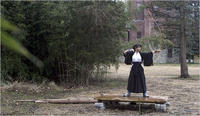 Hm, I didn't get around to saying anything about the Reboot conference, and it is already a month ago. Hm, I didn't get around to saying anything about the Reboot conference, and it is already a month ago.
As usual, a great event, an opportunity to hang out with smart creative people, and lots of stimulating concepts. I wish I had had a few weeks afterwards to actually act on the ideas that came up. See some of the videos here. I did a presentation called "The art of not-doing". The proposal is here. It went in a somewhat different direction than the proposal, though. I ended up using only the first 20 minutes for my actual presentation, and the last 20 minutes for a group Dialogue. That was an experiment. The talk was essentially to stimulate/inspire/provoke a certain state of openness, then followed by the type of Dialogue, à la David Bohm, where one sits together, quietly, mindfully, and one speaks when something actually needs to be said. I think it worked out well. My slides can be found at Slideshare. But since the slides only give half the story without the actual speech, there's now also an e-book version, which explains things more than the slides, so it better can stand alone. Thanks to Toothless Tiger Press As I usually try to stuff a lot into a small space, I might well expand on some of the themes I touched upon in upcoming postings here. [ Diary | 2009-07-27 16:56 | 9 comments | PermaLink ] More > |
| Monday, June 15, 2009 |
| Immaculate Telegraphy |
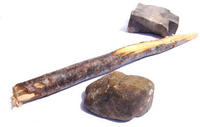 Immaculate Telegraphy is a blog charting out an attempt to go out into nature and create ... the internet. Or, more precisely: Immaculate Telegraphy is a blog charting out an attempt to go out into nature and create ... the internet. Or, more precisely: Could humans at any point in history, given the right information, construct an electronic communication network? To test this hypothesis, Substitute Materials will attempt to build a functional electric battery and telegraph switch from materials found in the wilderness, using no modern tools except information from the internet. The telegraph will be a first step towards an ahistorical internet.I find this kind of thing tremendously interesting. What is real knowledge? Knowledge that you can take it with you and that actually will be worth something? Lots of people are experts in stuff that would be completely useless if it weren't for a whole bunch of other things that would need to be in place. I'm a computer programmer - that'd do me no damn good if nobody would be able to manufacture computers. Our society is ridiculously inter-dependent. It was hundreds a years ago since there last were people around who were experts in all major fields at the same time. Today we're a society of specialists who most of them would be helpless and useless if it weren't for a whole bunch of other specialists. It is a fragile system. Civilization could very well collapse if it got a big enough bump. A simple job like that - go out in nature and create a telegraph - extremely primitive technology by today's standards - is an almost insurmountable task. OK, it is doable, of course, but very hard. It ought to be a basic boy/girl scout thing that everybody would learn to do as kids. How do you jumpstart the basic elements of our civilization in case it gets lost, or in case you get lost? [ Diary | 2009-06-15 00:58 | 23 comments | PermaLink ] More > |
| Friday, June 5, 2009 |
| Writing |
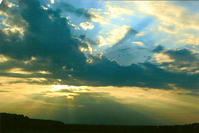 I haven't written much lately. I mean, not just here. I haven't written. I haven't written much lately. I mean, not just here. I haven't written.
I spend most of the day typing letters and numbers on a keyboard, but that doesn't do it. It is not that I'd want to have the job of being a writer either. The type of writing that works for me is what I can't easily plan for, and which nobody else can ask me for, other than maybe by posing an open-ended question. It is something that just appears, unfinished, that needs to be said, in order to be finished. It's a type of mindfulness, where the act of doing it is more important than the destination. But there's a bit of inertia there. Takes a bit of effort getting into it. Afterwards it is an effortless flow. But it is easy to forget. Let me not be as lofty as to pretend that what I write is a brilliant gift to the world. I'm really talking about my own inner feeling. There is a certain space that I enjoy, where I seem to have something to say, which seems to be worth saying, and I don't visit that space often enough. I get shocked and ashamed when I remember, and I notice that I've just spent months doing nothing much, and not paying attention. As to the moments where I did pay attention, I've forgotten them, because I didn't write about them, or from them. There are such moments every day. A spark of awareness. Something needs to be examined, discussed, experienced, written about. But if I ignore it, it is quickly gone, and the window closes again. Like a dream. If you don't write it down right now, it will quickly be forgotten. [ Diary | 2009-06-05 22:02 | 8 comments | PermaLink ] More > |
| Friday, July 11, 2008 |
| Freedom and Complexity |
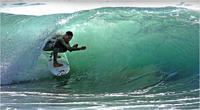 What is freedom? There are many definitions, like here from dictionary.com: What is freedom? There are many definitions, like here from dictionary.com:
There are other definitions of freedom, like, in science one talks about degrees of freedom, in the sense of the number of parameters in some process, or the number of directions in which some mechanical element can move. That's a different thing, but still related. Interestingly, none of these definitions talk directly about what you get out of it, what that buys you, and how useful and valuable that is. Yes, these kinds of freedom is something good and valuable in itself. Some of them are positioned as human rights or privileges, something that people would want to have if they don't have it, and which might be an end in itself. But there's kind of more to it. There's an important ingredient in freedoms that we will experience as valuable. If you can sit in prison and think anything you want, is that freedom? If you can say anything you want, but you can't do anything about it, is that freedom? Here are some other definitions of freedom that I made up:
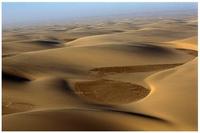 Let's take an example. Let's say I'm in the position to give you 10 square miles of property in the Sahara. Including some millions of tons of sand. It is yours to keep. You can do whatever you want with it, nobody's going to bother you, you've got totally free hands. You can say or do anything you want there. Total freedom. No? You don't want it? Let's take an example. Let's say I'm in the position to give you 10 square miles of property in the Sahara. Including some millions of tons of sand. It is yours to keep. You can do whatever you want with it, nobody's going to bother you, you've got totally free hands. You can say or do anything you want there. Total freedom. No? You don't want it?
The thing is that you probably wouldn't know what to do with it. Or, rather, it would be a whole lot of trouble and require a lot of additional resources to do anything useful with it. Even though it is free, and you're free to do what you want. In reality you can't do much with it.   OK, how about this car on the left? Take it home, here's the pink slip, do with it what you want, total creative freedom. OK, how about this car on the left? Take it home, here's the pink slip, do with it what you want, total creative freedom.
Or would you rather have the car on the right? It is tanked up, ready to go, it takes off vertically, flies 300 km/h, the keys are in the ignition, it has GPS, it handles like a charm. Chances are that the flying car there feels more like freedom to you than the wreck on the left. Even though, according to all the definitions of freedom at the top, you had the same amount of freedom. Not all freedom is worth having. The freedom you want is where you have the most options, and you get the most bang for your buck. This is where we get into complexity. Complexity in the sense of an intricate web of connections between stuff that together will do something potentially cool, useful and/or surprising. Now, that old clunker of a car up there. If you were well versed in the rich history of this car model, and you were mechanically gifted, and you had power tools, a network of parts suppliers, appreciative friends, a cozy garage, and a lot of time on your hands, that could be a great project. That could be freedom, but it requires this network of stuff connected to it for it to come to life. Those 10 square miles of Sahara desert, if you had engineers, bulldozers, a power plant, and a huge budget, you could build the city of your dreams. The usefulness of freedom depends on the complexity of the system around you. You don't want to have to do it ALL yourself. You want knowledge, tools, financing, friends, partners, etc. You want things to happen. When you push buttons, you want things to get into motion. We might forget to notice the richness of the complex world that exists around us. Most elements in our lives depend on a complex web of connections. You can only call somebody on your mobile phone because a lot of events have happened previously, clever people inventing and improving pieces of technology, connecting them together. You only have somebody to call because you have gone through the process of having friends, with which you have something in common. They again have other connections, other skills, other knowledge, etc. This whole complex web of people and stuff has evolved and self-organized. Not in a random way, but through a large number of meaningful individual actions. It is not the most perfectly organized and efficient system, but it is more or less the best thing that could have happened by itself. What you're in is a network, a system, where lots of work has gone into the way things are connected. Most of the pieces are already wound up, ready to go in one way or another. A system where, if you do something, it is likely to have an effect. Most of the time a small effect, but sometimes a big effect. Because everything is connected together, and if you manage to be in the right place at the right time, all the leverage in the world is potentially available to you. There's no perfect formula for knowing where that is, but the opportunity is there. My point is that useful freedom involves leverage, being able to do a lot with a little. To do that requires some kind of complex set of connections between people and resources. Large dynamic systems, like social networks, tend to self-organize into a critical state, the most efficient way it could have happened by itself, a state where there are lots of opportunities for making things happen. It is a bit of a mental leap to make freedom have something to do with complexity, but it makes sense to me. And of course it would be worthwhile to understand complexity a lot better. Particularly the type of complexity that might maximize freedom and value for the greatest number of people. [ Diary | 2008-07-11 01:43 | 16 comments | PermaLink ] More > |
| Wednesday, May 14, 2008 |
| Kriss Hammond wants to change my financial status |
| It took me a moment to remember the story... See, I did this posting in 2005: Jetsetters wants to sue everybody, which was about this fellow, Kriss Hammond, who said he wanted to launch a 10 million dollar lawsuit against me, because I had reposted some articles related to his outfit, Jetsetters Magazine. Articles written by some of his affiliates, specifically with a license to repost freely, with attribution. I don't know why they do that, if they don't want the articles to actually be used. Anyway, I had reposted them automatically, and they weren't particularly good articles or anything. Since the outrageous lawsuit threat was kind of amusing, I looked around a little bit, and found that Kriss Hammond seems do that kind of thing often, and that he runs a somewhat questionable business which involves paying him money to learn how to present oneself as a "travel writer", so that one can get free hotel rooms and that kind of thing. At least that's how I understood it.
I had mostly forgotten about it, until the guy sent me an e-mail yesterday: Hello Ming the Mechanic, also known as F Funch. We know who you are and where you live and operate. For some time you have had a posting about Jetsetters Magazine on the net that shoiuld be taken down, if you are truly a practioner of change. If you are not truly a practioner of change, we are about to change your financial status, as we did with Carl Parks.Carl Parkes was a vocal critic of the Jetsetters scheme, and is a (real) travel writer. Changing my financial status, hey, I'd welcome that, but I think he means it as a threat. I can guess why he doesn't like my previous posting. See, if you look up "Jetsetters Magazine" in Google, there are 48,000 matches, and mine is number 3. That's of course a bit annoying when one is trying to game the search engines with thousands of poorly written travel articles that all link to the Jetsetters homepage. 26 minutes later, Kriss sent me this message: When we originally posted Jetsetters Magazine articles on GoArticles.com there was no intention for you to use the articles within your site without our permission, which at your own admission, you did. Thank you for taking them down. Also, please remove your Ming the Mechanic reference to us, and in the future stop referencing us in any way or slandering or libeling our name online. We have helped many budding writer enhance their lifestyles, which you and Carl Parks have liebeled and slandered. We have taken care of Mr. Parks, and now are concentrating on you. We can have one of our colleagues call upon you if you wish, at 6 rue Pedro Gailhard, 31100, Toulouse France. Thank you for your understanding and consideration.It doesn't sound too good that they have taken care of Mr.Parks (it is Parkes, really). Or that he'd like to send some thugs to my door. Then, again, Kriss Hammond doesn't strike me as a very well armed opponent in the legal arena or in any other arena. Anyway, he wasn't done, so 18 minutes later: We will give you exactly until June 1, 2008 to remove all references online from you as Ming the Mechanic to Jetsetters Magazine and then we begin law suit procedures. We realize you are a professional programmer, and if there is any threats, real or inferred to our websites from you we will incorporate those threats, real or inferred into any existing or pending lawsuit. We will also attach this lawsuit to your chateaux in France through French courts. I don't think you really realize who you are dealing with. Our IT staff is monitoring all our websites for any illegal or illicit activity to them by you or others. We have deep pockets and relish any legal confrontations with you.Oh no, please don't touch my chateaux. I'd have to live on my yacht if you took them away from me. Now, today there was a Skype request to add "Kriss Hammond (jetsetters2)" to my contact list, with this reason "Jetsetters Magazine lawsuit". I don't think I want to chat with him on Skype about that at odd hours of the day, so I declined. I'm very approachable, and normally willing to discuss it if somebody is not happy with something I've posted somewhere. If Kriss Hammond had simply asked me to remove his travel articles back then, I'd just have done so. Oh, I did, but since he also threatened me, I wrote about it. Which I do now as well. You would get much further by being nice, Mr. Hammond. --- ... A day later: Kriss Hammond sent me a couple more messages where he actually sounded more human and friendly. I'm not sure if it is because of my e-mail answer or because he read this message. I sort of suspect the former. Anyway, that's a positive sign. Most people want things to come out well, but sometimes they pick the wrong strategy at first. [ Diary | 2008-05-14 12:45 | 19 comments | PermaLink ] More > |
| Wednesday, February 27, 2008 |
| Secrets of the park |
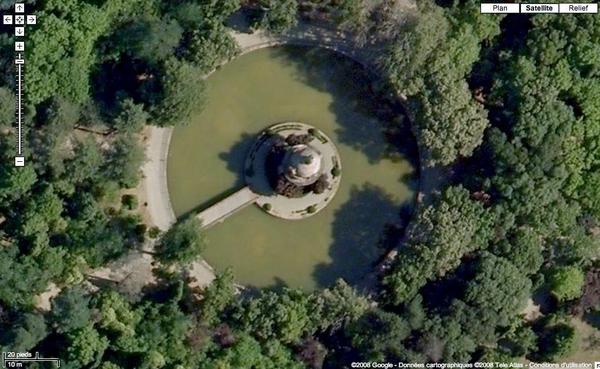 Next to the house we live in on Les Hauts de Ramonville is this huge walled-off area called Domaine Latécoère, which used to be the home of Pierre-George Latécoère, the airplane manufacturer. One can see his Chateau through one of the gates, but nobody seems to live there, other than some caretakers. Otherwise it supposedly is just a nature preserve. We can see the many kinds of trees in the forest from our kitchen window. Sometimes people are hunting there. But it is a private and closed area and the walls are tall. Would be no easy way of sneaking in there. But I'm terribly curious. Particularly since I concluded that this particular hill must have been the location, 1000 years ago, of Raymond IV's castle Bellevue, from which he took off on the infamous first crusade against Jerusalem with a thousand of his best knights, and lots of hangers-on. So, I looked in Google Earth, of course, to see what else was in there, apart from what I can see from the outside, like huge sets of stairs leading to the top. But at the time Google only had pretty low resolution pictures, so pretty much all one could see is that there's a little network of roads criss-crossing the area, and that most of them meet in one or two points, one of them seeming to be the top of the hill. ..But now, since recently, they have much better pictures. Nothing very surprising, other than this, on the picture, which seems to be what is found at the top of the hill, behind the chateau. A little round lake, with a bridge out to a little island, with a tower or pavillion. How exciting. There will of course be a hidden trap door at the bottom, leading down to the hidden treasure chamber. OK, I'm dreaming, I don't know if there's supposed to be a hidden treasure there, except for that the gold of Jerusalem sort of disappeared. [ Diary | 2008-02-27 14:43 | 3 comments | PermaLink ] More > |
| Sunday, February 24, 2008 |
| My Dad |
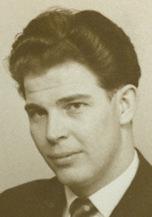 My Dad died this week. I didn't really know him very well, so it is hard to know what to feel. At first I didn't feel anything. And the loss I feel now is maybe more abstract than it is about him in particular. My Dad died this week. I didn't really know him very well, so it is hard to know what to feel. At first I didn't feel anything. And the loss I feel now is maybe more abstract than it is about him in particular.
It is important to have a father. Mine got divorced from my mother when I was 1 years old. I mostly didn't think about what it would mean to have a father, because I didn't really have one who was there. My mother married again, but I never considered the new guy my father, even though he obviously was a continuous male presence. And I didn't see my real father much. Maybe a total of 2 or 3 times as I was growing up. I liked him. His particular way of speaking, Copenhagen dialect, from I'm not sure what exact part of town, made me feel somehow safe and comfortable, as if I was used to it from when I was a baby, even though I don't really remember. And not that he ever really acted much like a father, even though he always was friendly. He didn't do anything in his life that will make any history book. He was a fireman for a while, a taxi driver for a while, and an assortment of other odd jobs that didn't last overly long. I have no problem with that, I'm kind of proud of coming from a simple working-class family. I wish I had inherited his hair. He still had a full head of wavey dark hair last I saw him, whereas I'm close to bald. I maybe wish I'd have a lot of memories to talk about. Although maybe it is better not to. What I'm sad about is maybe the thought of the importance of having a father. I wish I had had a father more. And maybe it reminds me that I haven't always been as present with my kids as I could be. Oh, I'm still here and haven't gone anywhere, but one could of course always have done it better. At any rate, I'll be in Denmark at the end of the week for the funeral. [ Diary | 2008-02-24 21:18 | 17 comments | PermaLink ] More > |
| Wednesday, September 19, 2007 |
| Indiceco |
 The last few months I've been rather busy with a little start-up company I'm a partner in. The last few months I've been rather busy with a little start-up company I'm a partner in.
It might not be terribly interesting to you unless you're in France and in certain types of profession. But, in brief, it is a service that delivers business statistics online. Right now mainly various kinds of analysis of business sectors. For example, any company would have a need for knowing how their sector is doing in general. If you're manufacturing plastic tubing, you'd of course want to know how that market segment is doing, and how all your competitors are doing. Is their business expanding, are they investing, are they turning a profit. There's a whole bunch of indicators and ratios of various kinds, hundreds of them, that are meant to show you that. But it is not entirely straightforward to produce such an analysis. Larger companies would probably have somebody who's job it is to produce that kind of reports, but a smaller company doesn't. So, the idea is to make it very easy. In a few seconds you can get a whole series of well thought-out reports on what is happening in any segment you choose. If all you want is one snapshot, you buy the report and you're done. If you regularly need to do such things, you get a subscription, and you can analyze any segment any time you want. That would particuarly make sense for a consultant or accountant or banker who often needs to advise people in different businesses. The company is called Indiceco, as in Indices (indicators) Economiques. The website is here. It is in French, obviously. But you can probably get a sense of it. You pick a business sector, and you see some different numbers, and there's a variety of different presentations to choose from. More will follow as more databases and more presentation formats are added. Accounting figures isn't normally something that excites me, but the idea of taking huge amounts of data and simplifying it into something you can access in simple ways, and model in real time, is something I like. The world is too complicated and we need ways of making it more simple. The system there is developed in Ruby on Rails, and I'm basically the developer. My two partners, Anthony and David fill in complementary roles by being experts in stuff I'm not well versed in, like the actual accounting details, legal matters, and sales. [ Diary | 2007-09-19 22:25 | 3 comments | PermaLink ] More > |
| Tuesday, August 14, 2007 |
| I see, therefore I blog |
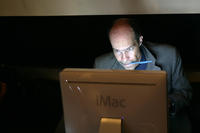 Every time I haven't blogged for a while, I feel the urge to get philosophical about it. Maybe just some kind of defense mechanism, because I feel guilty, I don't know. Every time I haven't blogged for a while, I feel the urge to get philosophical about it. Maybe just some kind of defense mechanism, because I feel guilty, I don't know.
Anyway, the thing I like about blogging is that I can write whatever comes to mind, and I don't have to stay with any given theme or agenda. Because at some point I discovered that this is the only way I can write. I absolutely hate if somebody asks me to write an article on a certain subject, on a deadline. I don't do that, and if I try, the result isn't great. Rather, it works if it is some kind of channeling, where something comes to me, and I write it. And later I maybe discover that there's some kind of thread through what I've written, and some of it is pretty clever. But if I had had to plan it, I'd have screwed it up. Now, blogging isn't entirely perfect, but it is the closest thing I know at the moment that fits what makes me write. What isn't perfect about is is that after having had a blog for a while, one develops some idea of who the audience is, and one suddenly feels obligated to write something that suits that audience. Which doesn't work well for me. I prefer to write for myself, and then, as an afterthought, maybe share it with others. But on a blog, what I write sort of goes out right away. So I can't easily forget the fact that somebody will read it shortly after I write it, and that makes me be more selective than I maybe should be. Maybe the answer is to not publish in real time, I don't know. In the past I've written whole books by writing just for myself, as notes or a diary, and then only choosing to share it later. I suppose I could blog like that too. Whether I blog or not is to some degree a function of whether I'm awake. I have something to say if I'm paying attention, if I'm mindful. There's a certain mode of being, where life is a continous process of discovery. If I didn't have to work, I would happily stay in that state all day long, and I'd have a lot to say. But if I have things to do, deadlines, work, stress, too few hours in the day, it is a little hard to get back into it. I sometimes, rarely, wake up (in the middle of the day), shocked that I haven't been conscious for a while. From that perspective I feel like a stone skipping across the ocean. You know, suddenly realizing that it is 10 years or 20 years since one last paid attention to some particular thing, a smell, a thought, a memory, a feeling. And it is like, I can do that about 6 or 8 times, and I'm already old or dead. A bit of a waste, of life. Where, in principle, every day could be a full conscious experience, being alive, paying attention, experiencing it all. Which is what I'd like to do. But lots of stuff gets in the way, like work, that makes me dive into things for long periods of time, that aren't even all that interesting, and that are somewhat a waste of life. And only once in a while do I come out, shocked that it has been so long since I found myself. But blogging is actually one of the things that remind me that I need to pay attention. Sure, I could just automatically repost what other people are writing, without paying much attention. But I'm talking about the type of blogging where I actualy say something, like right now. I hope. It is not quite the perfect medium, though. A perfect medium would be one where I can express whatever I'm exploring, experiencing, thinking, without worrying about whether it will play well, or whether it is consistent with what I normally say, or with what the audience expects. OK, maybe that's a diary, and not a blog. But the interesting part is how something very personal might be shared, and might add value to a social network. When I'm not blogging, it isn't just that I'm not paying attention, it might also be that I'm paying attention to things that follow different themes than what I normally write about. So instead of just writing about whatever interests me at the moment, I suppose I censor myself, and I don't write before I'm back to a recognizable theme. But I think I'd be more happy with an information appliance I could write into, no matter the subject, and then afterwards decide where to channel it. Some stuff might be my private notes, other things would be suitable for publishing, but maybe to different channels. Although the input method in principle could be any text editing program, it somehow isn't quite right for me. I need some sort of life blogging thing, with categorization ability, and choice of whether and if to publish things afterwards. I should maybe make such a software myself that suits me, if I didn't have too many other things to do. Anyway, I just wanted to mention that I was paying attention. Exactly to what, I'm not sure, but paying attention is a good start. [ Diary | 2007-08-14 21:52 | 2 comments | PermaLink ] More > |
| Monday, August 6, 2007 |
| Genealogy |
 I somehow got hooked on online genealogy research. I somehow got hooked on online genealogy research.
My brother and I had talked for a while about researching our family tree, and he had gathered a bit of information from relatives, but it was only after somebody introduced me to geni.com that it really got anywhere. (Thanks, Thomas!) There are many genealogy websites on the net, but Geni does it in a more accessible Web2.0 kind of way, mainly through a flow chart kind of display one can scroll around in continously. Article about geni in L.A. Times yesterday. Now, I used to think that family history was an extremely stuffy thing to be into. My stepfather once got very interested in his family tree, filled up a wall with old photos of sour-looking ancestors, and bragged to no end about his 10th great grandfather being Christian IV, king of Denmark. I thought it was so not interesting. Who cares about boring long dead people. Now my own immediate family ironically thinks I'm equally nutty, happily spending hours looking for ancient ancestors. For those who don't find genealogy interesting, it often seems like a particularly offensive waste of time. But I'd say it ought to be of some kind of concern, where one comes from, genetically speaking. I wouldn't be here without my parents, and they of course wouldn't have been there if it weren't for their parents, etc. I've learned a variety of interesting things from this new time-wasting hobby: - There's an enormous amount of information available on the net. Lots of people have uploaded their family trees. Countries have scanned in and uploaded church records, census records, immigration records, etc. And the Mormons have created enormous online databases of just about anybody's ancestors they can get access to. The result is that I often can look up the name of some ancestor 5 or 10 generations ago, and he or she actually shows up in Google. Wheras my contemporary relatives mostly are invisible on the web, my older ancestors are not necessarily. There's something surreal to being able to track the lives of unknown nobodies of hundreds of years ago from my computer. - Researching history is an interesting puzzle of trying to piece together what really happened based on a few sketchy visible traces in bad condition. The source materials are hard to find, and their information is often hard to decipher or erroneous. In this case, the gothic writing in church records from the 1700s is a bit of a challenge, and census records are sloppy with the spelling of people's names. Yet, if you find several pieces of information, you can triangulate approximately what happened. - There are websites like ancestry.com that aim for gathering a database of everybody who ever lived that there's a record of, the One World Tree. How's that for a collaborative application of the Internet? - This is essentially social networking for dead people, which is kind of weird. You track down people from many years ago, add stuff to their profiles, link them together, and make the whole thing public on the net. - Imagine how over time more and and more historical information will be digitized, and better search mechanisms will be developed, including for fuzzy searches. In principle, if there's enough data, and the search algorithms were clever enough, a computer program would eventually be able to build your family tree for you, or do similar feats with other kinds of fuzzy historical information. That connects in with the inevitable capability to record and index everything about our own lives in the not too distant future, and the interesting part is that it also can include historical information, from before anybody thought of such things. - Despite it being fascinating to find them, I must so far conclude that I have had a rather undistinguished family. All the way back to the early 1500s, I find almost nothing but plain people who've been poor, unskilled workers. A relatively few of them have had a profession, like blacksmith, and the most distinguished have made it to be land-owning farmers or civil servants. Nothing wrong with that, I'm quite proud of being working-class, but I'd have expected to have found some kind of nobility by now. Which in part would be fun because I right away would find a lot of ancestors there. But, no, we're mostly talking day laborers who all got 12 kids, half of which became servants for more well-off people. Many died young. If the husband died, the rest of them ended up in the poor house. Life back then seems somewhat depressing seen from here, although I don't know what people actually felt about it at the time. Anyway, there's (only) around 350 people in my family tree so far, so a lot more to find. So far it has lead from Denmark to Norway, Sweden and Germany, and the earliest ancestor is so far a farmer named Eivind Stangaland from Norway, born 1505. [ Diary | 2007-08-06 20:17 | 9 comments | PermaLink ] More > |
Page: 1 2 3 4 5 ... 15 Older stories >>